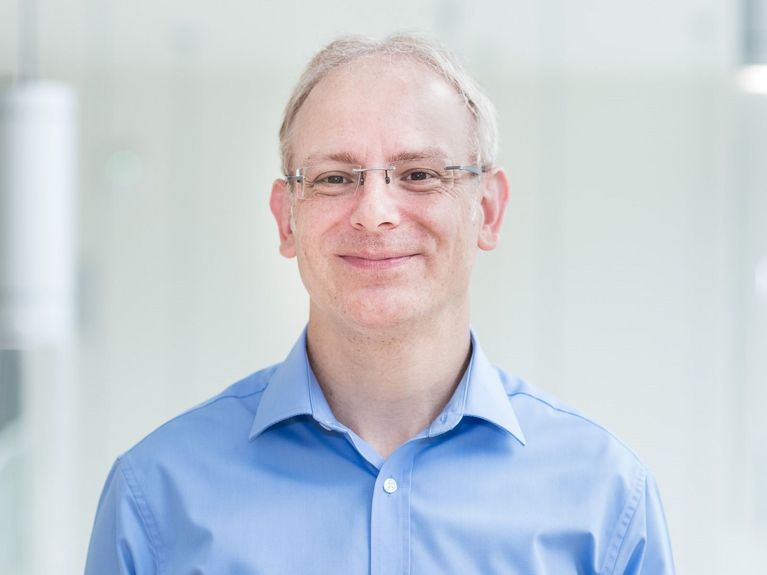Portrait
The philosopher at the computer

Cas Cremers. Picture: CISPA
Dutch computer scientist Cas Cremers researches cyber security in Saarbrücken - and has made a monkey his mascot for secure internet connections.
The book is still on Cas Cremers' bookshelf, as it has been for almost four decades: "Fatherhood" is its title, and although he has never read it, it symbolizes an important step in his career. Eleven years old at the time, a sheltered boy from a village in the south of the Netherlands, he was electrified by a programming competition he came across. "We didn't have a computer at home," he recalls, "so I solved the problems on a piece of paper. He came first and was awarded the book as a trophy, something he could do little with as a schoolboy.
Casimier Joseph Franciscus Cremers, to give him his full name, now works in an office in Saarbrücken, and in addition to the aforementioned book, there is another thing that has helped him get there: His enthusiasm for computer science. But the problems he deals with are much more difficult, in fact, they are some of the most complex challenges in the field of computer science: At CISPA, the Helmholtz Centre for Information Security, Cremers conducts research at the interface between cybersecurity and cryptography.
Behind his desk he has placed a plush monkey, something of a landmark. "It was a gift from my students at Oxford when I was a professor there," he says, "it's a tamarin monkey." Tamarin: That’s the name he gave to the software he helped develop, which plays a key role in the daily lives of Internet users but is known only to insiders. Known as the Tamarin Prover, it analyses whether the steps in a security protocol are really secure. "You can think of it like a detective at a crime scene checking for clues. You don't use a magnifying glass and a fingerprint brush, you use mathematical methods," says Cas Cremers. And because he found the tamarin monkey with its long white whiskers so striking, he quickly made it the logo and namesake of the software.
He has long since got used to the fact that outsiders have a hard time understanding what he is actually researching. He is a patient explainer. "Before we even see an image or read text, our own device has already exchanged messages with computers on the Internet and executed program code," he says. "Everything interlocks like cogs. Even a small bug can make an entire program or service insecure. This is a gateway for hackers and other bad actors. The answer to this danger is called formal verification: A mathematical proof that checks every line of software code. The problem is that today's programs and protocols consist of hundreds of thousands of lines of code. "It's easy to feel like you're in a labyrinthine garden with no boundaries," says Cas Cremers. He is working on approaches such as the Tamarin Prover, in which humans and computers combine their skills to search for errors: The human does the thinking out of the box, the computer does the millions and millions of calculation steps. The Tamarin Prover, for example, uses this method to check Transport Layer Security (TLS) version 1.3 - one of the most important protocols on which Internet security is based.
Cas Cremers almost became a philosopher in the process. He studied computer science and philosophy at the Universities of Eindhoven and Tilburg, but just before graduation he decided to concentrate on just one of them. As a secondary school student, he had already founded a software company that had launched a series of computer games. Even then, Cas Cremers was an indispensable member of the team: He programmed, composed the music, took care of the graphics and dramaturgy, tried his hand at everything. "I am not afraid of new tasks," he says with a laugh: "I always think to myself: let's see how far I can go!”
This attitude also helps him in his work as a researcher, where he also worked at ETH Zurich and Oxford before becoming a professor in Saarbrücken: "Many tasks in computer science are highly complex and so large that they seem almost overwhelming, especially in the field of information security. When in doubt, the attackers are always one step ahead of the defenders, and this is as true on the Internet as in other areas of life. "Someone has built swords, and we are building shields to protect against them," says Cas Cremers, and when he talks about it, you can hear his background as a philosopher: One of his specialties, the secure exchange of information, often involves the political question of how much data a state should receive from its citizens in order to solve crimes or prevent crime, for example. To what extent should messages be encrypted? "In these debates, I'm usually in favor of privacy," says Cas Cremers.
Cas Cremers has carried his passion for computer games from his youth, when he programmed games, to the present day. Sometimes, after work, he sits down in front of the monitor to unwind from the stress of the day. There is only one question to which he has yet to find an answer: How can he ensure that his two children don't steal his console? Philosophy is of little help here.
Readers comments